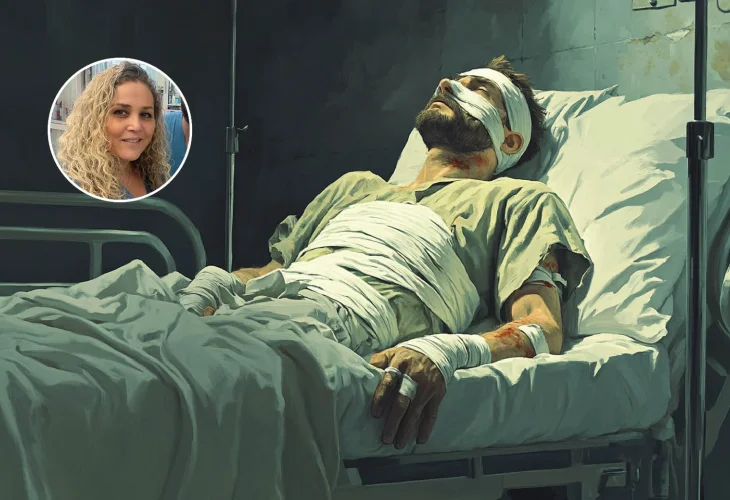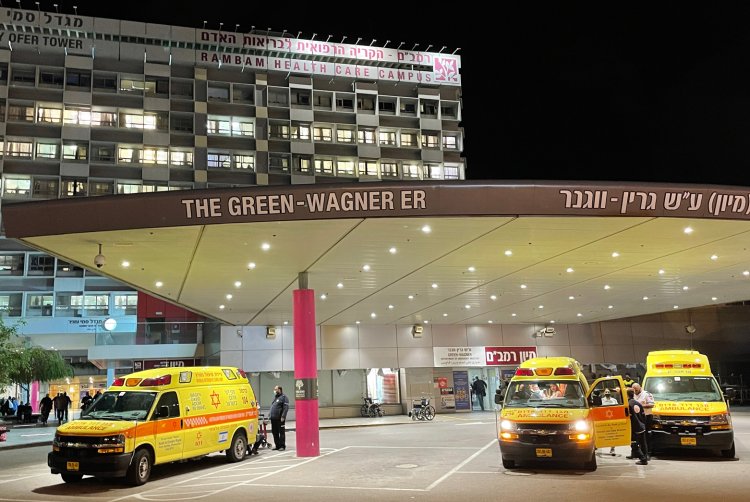Moments of Hope: Inside an Israeli ICU Amid Conflict
The toughest patient's humble request, innovative tech helping wounded soldiers, and the resilience of Rambam Hospital's medical team during wartime.

In recent months, as conflict in the north intensified, the ICU team at Rambam Hospital took a deep breath. With extensive experience from previous wars and as the largest hospital in the north receiving injured soldiers, they sensed what was coming and prepared with a broad strategic approach.
Osnat Aspis, the head nurse in the general ICU led by Dr. Yaron Bar Lavi, notes that in peacetime, their unit, one of the largest ICUs in Israel, consists of about 60 professionals, including doctors, nurses, social workers, physical therapists, occupational therapists, a dietitian, as well as external consultants and support staff.
"We have an incredible team managing this unit," she emphasizes. "Usually, we care for those injured in severe car accidents, falls, large burns, and similar incidents. This time, we swiftly switched to treating war injuries, welcoming our cherished soldiers directly from the battlefield."
Stories of Valor
When Osnat talks about the soldiers, she recalls several heartwarming stories. "We had a soldier, M, who was deemed the most critical patient for weeks, unconscious," she shares. "His mother never lost hope, hanging an Israeli flag at his bedside and asking every visitor to sign it and add a blessing. It bore wishes from President Herzog, Ministers Barkat and Galant, and senior military officers. One night, a nurse passing by heard him speak, astonishingly requesting politely: 'I want cold water.' From that moment, he rapidly recovered and two weeks later, we transferred him to Loewenstein Hospital for further rehabilitation, of course with the flag still by his side."
Another memorable soldier was R, who arrived early in the conflict severely injured by an anti-tank missile. "His body was riddled with shrapnel," describes Osnat, "and it took hours to bandage him each time we treated him. His most significant injury was a large fragment that traveled through his face and jaw, stopping just millimeters from a major artery. Had it hit differently, there would have been nothing we could do. We decided from the start to fight for his quality of life, with the sky as the limit."
"He was sedated and on a ventilator for a while, and once conscious, we initiated extensive work to reconstruct his jaw and treat his wounds. Even a year later, R continues to come to Rambam for treatments, and each visit fills us with excitement. He's walking, talking, smiling—it's hugely satisfying."
 (Photo: Shutterstock)
(Photo: Shutterstock)The Strength of Families
Rambam values not only the soldiers but also their families, who often leave homes, jobs, and lives to stay at the hospital guest rooms, remaining close to their injured loved ones.
"About a month and a half ago, we received a soldier from Lebanon with severe head and abdominal injuries," Osnat recollects. "Here, treatment extended beyond the body to battle neurological recovery, striving to enhance consciousness with the Eyecon system developed here alongside Dr. Godd Shahar and Reuth Medical Center, allowing active family involvement through communication by blinking. The family's first communications with their son after a month of inability to connect left us all in awe."
Family struggle is tangible, Osnat illustrates: "One soldier’s mother stayed by his side constantly, explaining, 'If I go home, the journey back here would remind me of the day of his injury and the officer's dreadful news. I can't endure that again.'
"After staying with her son for a month, I invited her to take a stroll by the nearby beach. We sat on a bench, watched the waves, and talked about things unrelated to her son or his injury. In that moment, I realized how crucial it was. Families are integral to recovery, and I make it a priority to keep them connected, viewing them as part of our team."
Osnat pauses, adding this time feels more personal because her own sons serve in the IDF. "I often ponder how I’d want to be treated, what I'd want to hear if it were my sons," she says candidly.
Believing in Miracles
While stories of recovery empower staff, there are challenging moments, Osnat admits: "Our unit excels worldwide with extremely low mortality rates, yet sadly, we’ve seen patient deaths. These losses during this war have been particularly hard on us all."
"Seeing a patient suffer is another challenge. Despite providing ample medication, some situations leave us helpless. There's also the emotional toll of injured soldiers awakening to loss, asking 'Where are my friends?' as we deliver painful truths, or realizing their permanent physical changes, like an inability to walk. These moments are difficult, but we support them with psychological and social aid as needed. Still, even we sometimes need support, leading me to arrange group sessions with a psychologist to discuss our experiences."
What personally gives you strength at work?
"The miracles and extraordinary recoveries, particularly the patients who return to visit the ICU. These visits often follow prolonged rehabilitation and are profoundly touching—they feel like our own children coming home. Videos from these journeys also uplift us, especially when shared with their families' blessing. Just today, a mother sent a recording her son made, saying: 'If you want to hear, this is my voice.' Hearing this from someone who couldn’t speak is spine-tingling."
"Additionally, such work grants perspective. Returning home to loved ones makes us grateful for their presence, emphasizing that nothing should be taken for granted. Frequently, I stop and ask, 'Why was I upset?' gaining clarity that many things pale in comparison."
Any message for families out there?
"Prepare for the emotional rollercoaster of the ICU. It has tough days, but hopeful ones too. Keep faith and optimism, for even after the hardest days, better ones are ahead."

